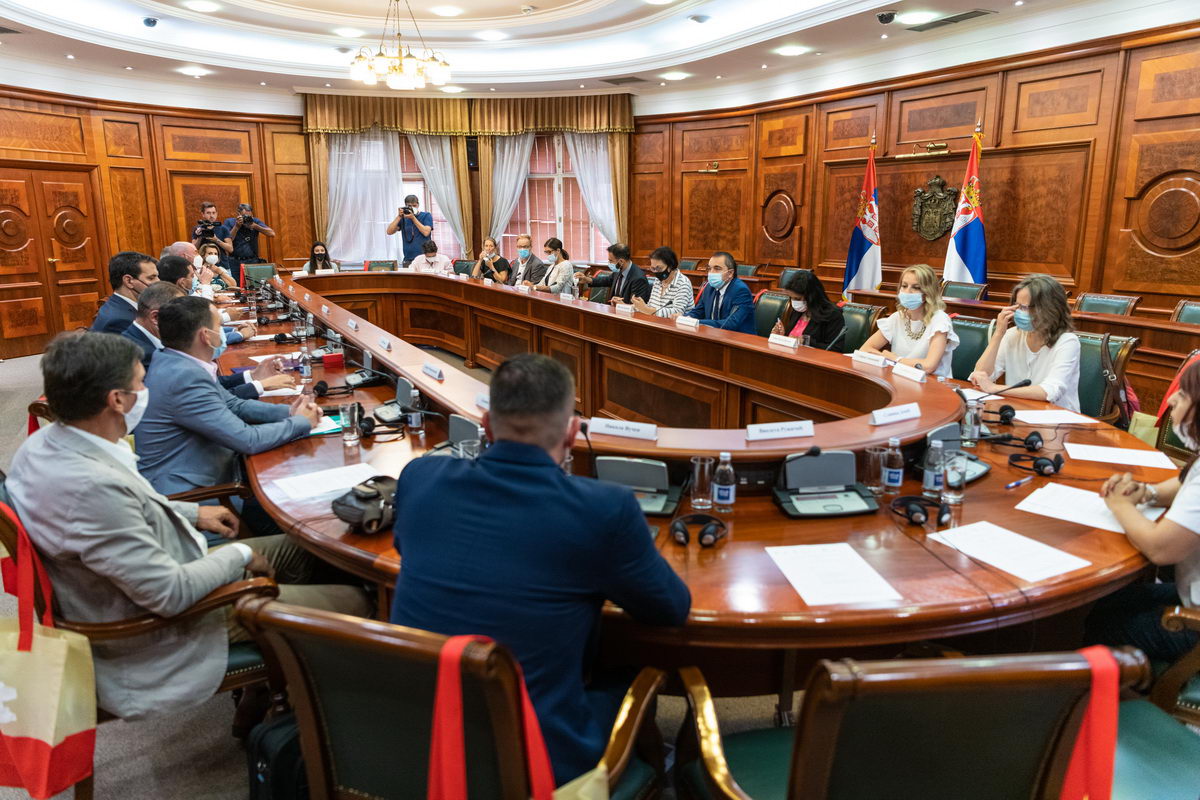 On 14 July 2021, an event was held in the building of the Government of the Republic of Serbia launching the project “Reducing Additional Vulnerability of Roma Men and Women and other Marginalised Groups, Caused by the COVID-19 Pandemic in 18 Local Self-governments”, whose goal is overcoming the challenges caused by the COVID-19 pandemic in the field of education, improving access to water, providing information and promoting immunisation against COVID-19, as well as providing technical support to the competent local institutions for monitoring the course of the COVID-19 pandemic.
On 14 July 2021, an event was held in the building of the Government of the Republic of Serbia launching the project “Reducing Additional Vulnerability of Roma Men and Women and other Marginalised Groups, Caused by the COVID-19 Pandemic in 18 Local Self-governments”, whose goal is overcoming the challenges caused by the COVID-19 pandemic in the field of education, improving access to water, providing information and promoting immunisation against COVID-19, as well as providing technical support to the competent local institutions for monitoring the course of the COVID-19 pandemic.
The General Secretariat of the Government of the Republic of Serbia signed the Project Implementation Agreement, and the Social Inclusion and Poverty Reduction Unit of the Government of the Republic of Serbia (SIPRU) will be responsible for its implementation with sub-implementing partners Centre for Interactive Pedagogy (CIP) and Ecumenical Humanitarian Organisation (EHO), and with the support of the German development cooperation programme “Inclusion of Roma and other Marginalised Groups in Serbia”, implemented by GIZ. The leading political partner is the Ministry of Human and Minority Rights and Social Dialogue.
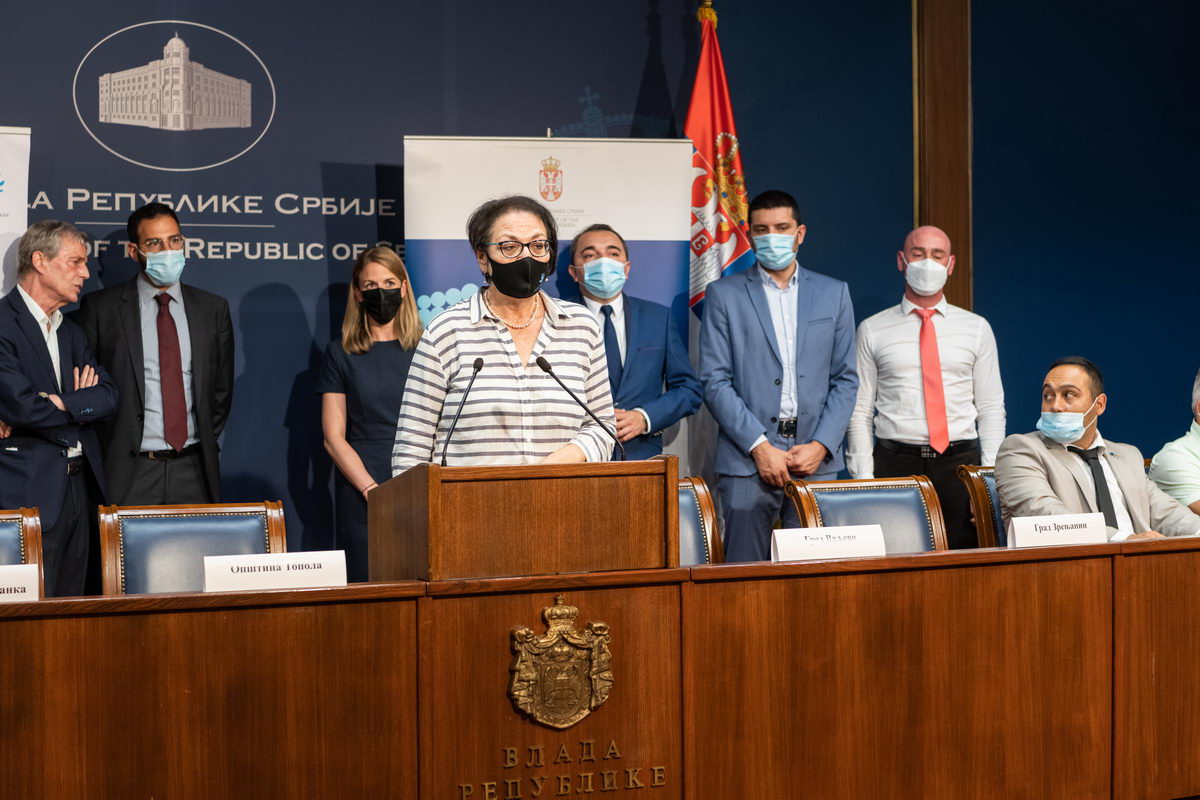 Gordana Čomić, Minister for Human and Minority Rights and Social Dialogue said that great hardships were always the hardest for those who have the least opportunity to defend themselves, regardless of whether those hardships were local like earthquakes and floods, or global like a pandemic that put the entire planet on hold and made us think about how difficult it was to survive in restricted conditions. “It is not a small pleasure that as the Ministry of Human and Minority Rights and Social Dialogue, in cooperation with GIZ, SIPRU and local self-governments, we can participate in a project that will prove for the next six months that we do not want to leave anyone behind because they are more vulnerable,” said Čomić. Furthermore, she pointed out that the support to the education of about 500 children, drinking water for more than 500 Roma and other families, and the immunisation necessary for everyone, which would all be provided by the project, were extremely important. “Only through dialogue and cooperation can we reduce the difficulties caused by pandemic,” concluded Čomić.
Gordana Čomić, Minister for Human and Minority Rights and Social Dialogue said that great hardships were always the hardest for those who have the least opportunity to defend themselves, regardless of whether those hardships were local like earthquakes and floods, or global like a pandemic that put the entire planet on hold and made us think about how difficult it was to survive in restricted conditions. “It is not a small pleasure that as the Ministry of Human and Minority Rights and Social Dialogue, in cooperation with GIZ, SIPRU and local self-governments, we can participate in a project that will prove for the next six months that we do not want to leave anyone behind because they are more vulnerable,” said Čomić. Furthermore, she pointed out that the support to the education of about 500 children, drinking water for more than 500 Roma and other families, and the immunisation necessary for everyone, which would all be provided by the project, were extremely important. “Only through dialogue and cooperation can we reduce the difficulties caused by pandemic,” concluded Čomić.
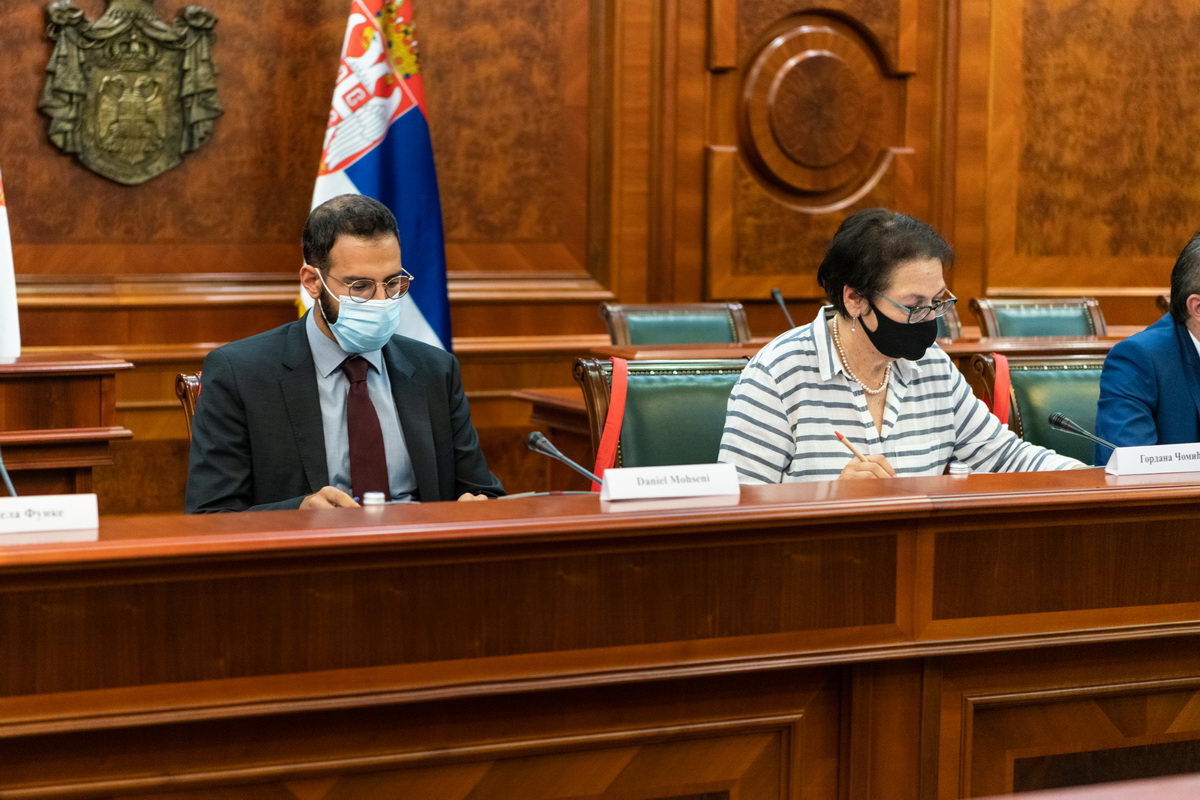 Daniel Mohseni, a political advisor at the Embassy of the Federal Republic of Germany in Belgrade, stated that human rights, access to services and relevant information were the key building blocks of any society. “Access to education and information will be improved through project activities during the pandemic and in the post-crisis period.” “The plan is to improve access to quality learning, as well as help schools in the form of IT equipment for 500 Roma and other socially vulnerable children,” said Mohseni. Furthermore, he stressed that the project would provide expert and technical support to enabling access to water for 545 families living in inadequate conditions.
Daniel Mohseni, a political advisor at the Embassy of the Federal Republic of Germany in Belgrade, stated that human rights, access to services and relevant information were the key building blocks of any society. “Access to education and information will be improved through project activities during the pandemic and in the post-crisis period.” “The plan is to improve access to quality learning, as well as help schools in the form of IT equipment for 500 Roma and other socially vulnerable children,” said Mohseni. Furthermore, he stressed that the project would provide expert and technical support to enabling access to water for 545 families living in inadequate conditions.
As Dragana Jovanović Arias, Manager of the Social Inclusion and Poverty Reduction Unit of the Government of the Republic of Serbia, said, SIPRU had been monitoring the needs and challenges of vulnerable groups at the local community level since the beginning of the pandemic, which would not have been successful without cooperation at the local level. “Thus, we recorded that in the period of the two most intense waves of the pandemic last year, about 140,000 packages of food, hygiene and protective equipment were distributed to vulnerable groups, of which as many as 58,000 were distributed to Roma households. This indicates that the protection network for this vulnerable group was the most interconnected, including local mechanisms for Roma inclusion, civil society organisations and young Roma activists,” said Jovanović Arias.
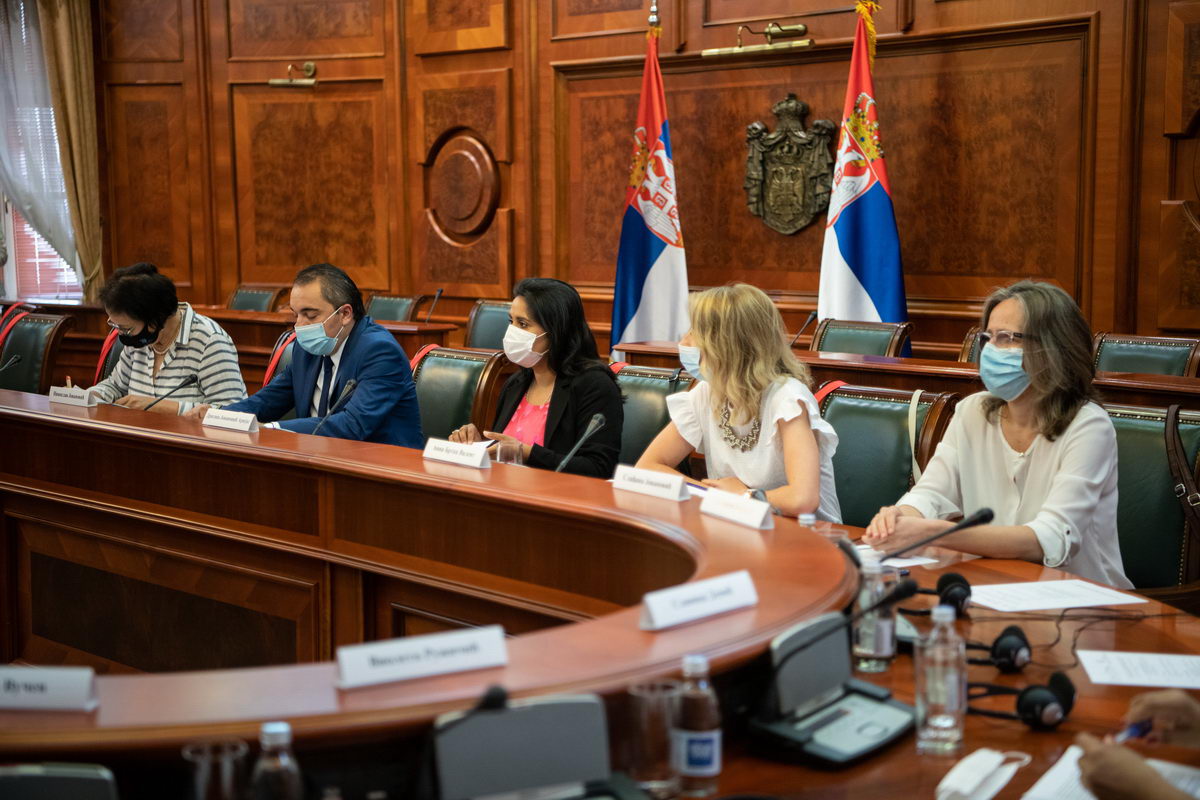 Mapping 702 substandard Roma settlements showed that a considerable number of people do not have access to water. “However, local self-government units have shown great interest in the possibility of cooperation with GIZ in gradually solving these issues. The selected local self-government units and PUC Waterworks quickly joined the preparatory phases of this project, and their readiness to allocate funds from local budgets for improving access to water, which make up almost 6% of the total value of the entire project, is especially important,” she said and explained that, in addition to water supply, education and support for immunisation were also part of the project. “For each area, we envisaged three key steps: the first is to resolve a specific issue or provide specific support, the second is to improve cross-sectoral cooperation, and the third is to provide direct technical support in donations of technical equipment for educational and health facilities,” concluded Jovanović Arias.
Mapping 702 substandard Roma settlements showed that a considerable number of people do not have access to water. “However, local self-government units have shown great interest in the possibility of cooperation with GIZ in gradually solving these issues. The selected local self-government units and PUC Waterworks quickly joined the preparatory phases of this project, and their readiness to allocate funds from local budgets for improving access to water, which make up almost 6% of the total value of the entire project, is especially important,” she said and explained that, in addition to water supply, education and support for immunisation were also part of the project. “For each area, we envisaged three key steps: the first is to resolve a specific issue or provide specific support, the second is to improve cross-sectoral cooperation, and the third is to provide direct technical support in donations of technical equipment for educational and health facilities,” concluded Jovanović Arias.
On this occasion, an Agreement on Cooperation was signed between the General Secretariat of the Government, eight cities and municipalities and the Ecumenical Humanitarian Organisation in order to improve access to water in substandard settlements.
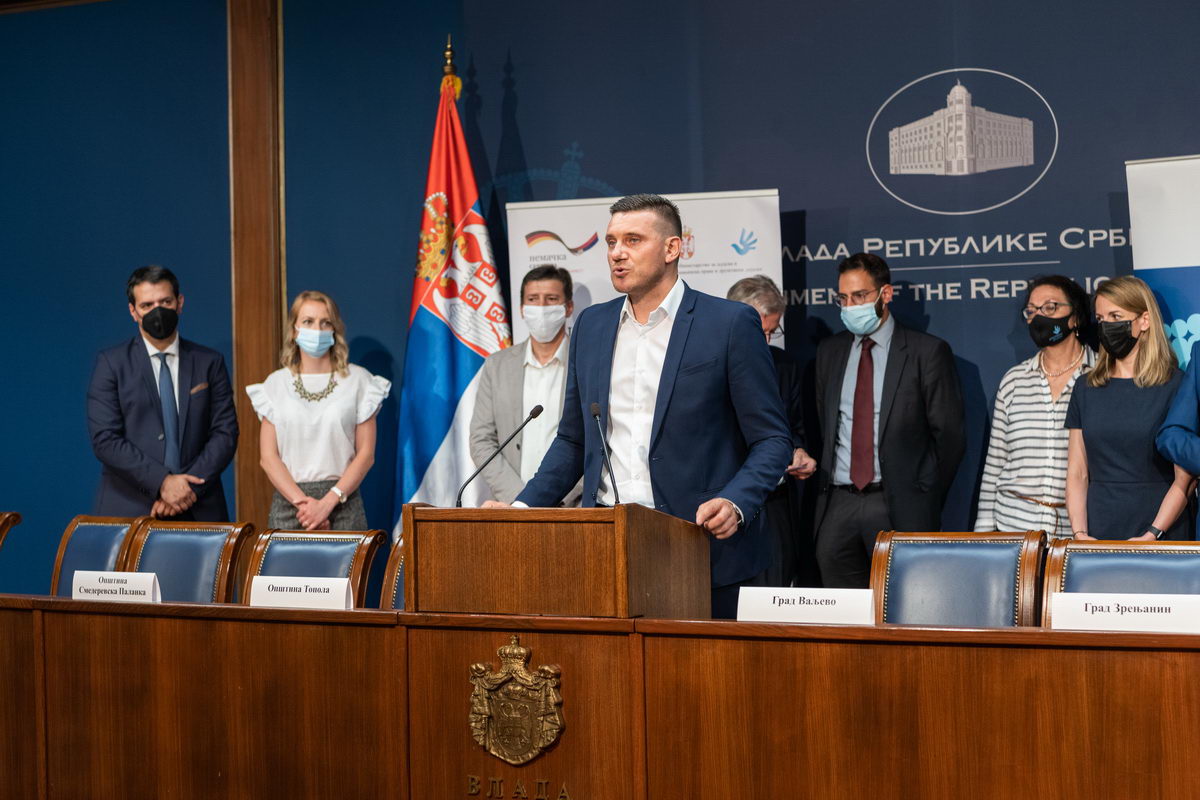 The President of the Municipality of Smederevska Palanka, Nikola Vučen, pointed out that the Municipality strived to respond to the needs and challenges faced by all citizens, especially those who were on the edge of existence. “The Agreement we are signing today is another proof that we, as a municipality, are ready to make all our resources available to our citizens.” “Thanks to this project, 170 families in the Pridvorice village in Smederevska Palanka will have access to drinking water,” Vučen said.
The President of the Municipality of Smederevska Palanka, Nikola Vučen, pointed out that the Municipality strived to respond to the needs and challenges faced by all citizens, especially those who were on the edge of existence. “The Agreement we are signing today is another proof that we, as a municipality, are ready to make all our resources available to our citizens.” “Thanks to this project, 170 families in the Pridvorice village in Smederevska Palanka will have access to drinking water,” Vučen said.
Measures and activities of this project seek to contribute to reducing the additional vulnerability of Roma families and other marginalised groups living in 18 local self-governments (Nova Crnja, Zvezdara, Kruševac, Kraljevo, Loznica, Bor, Niš, Vranje, Pirot, Vladičin Han, Stara Pazova, Kovin, Zrenjanin, Smederevska Palanka, Topola, Valjevo, Kanjiža and Alibunar), by building the capacity of local actors for urgent response with an inclusive approach.
In education, support will be provided to primary school students in learning and to parents so they can help their children during schooling. In addition, technical equipment will be provided as a prerequisite for distance learning and fulfilment of school tasks. When it comes to providing information, prevention, and promotion of immunisation against the COVID-19 pandemic, Roma families will be given advice on preventive measures and information on the importance of the immunisation process, and protective equipment will be distributed.
Improving access to water will be provided by finding permanent solutions for 545 vulnerable families living in 11 substandard settlements in the municipalities of Stara Pazova, Kovin, Zrenjanin, Smederevska Palanka, Topola, Valjevo, Kanjiža and Alibunar, through the construction and upgrade of water supply networks, i.e. providing individual connections to the water supply network. The beneficiaries of the project are primarily Roma men and women, returnees living in 18 local self-governments, and members of other marginalised groups.
 Government of the Republic of Serbia
Government of the Republic of Serbia



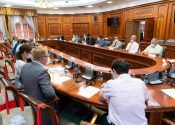
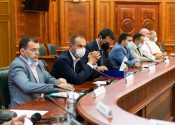
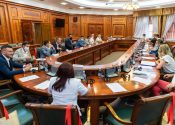
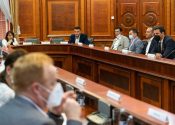
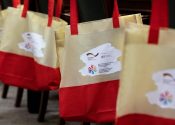
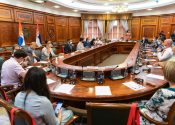
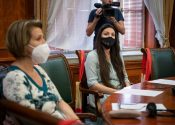
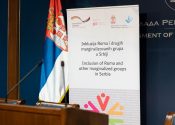
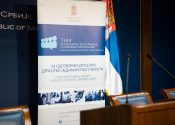
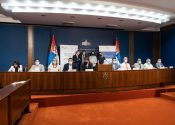
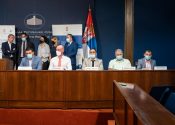
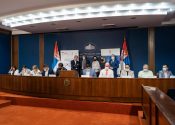
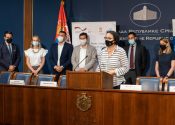
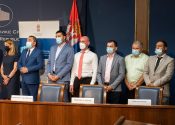
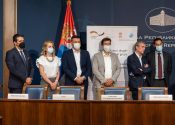

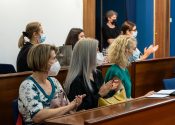
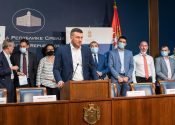
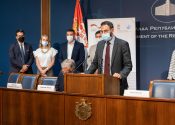
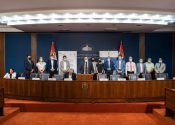
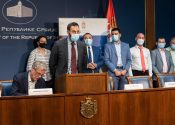












 pdf [271 KB]
pdf [271 KB]
Leave a Comment